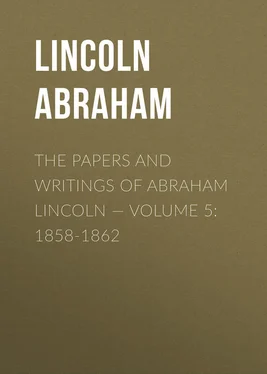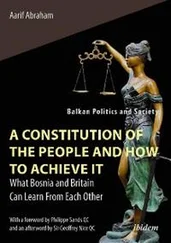Abraham Lincoln - The Papers And Writings Of Abraham Lincoln — Volume 5 - 1858-1862
Здесь есть возможность читать онлайн «Abraham Lincoln - The Papers And Writings Of Abraham Lincoln — Volume 5 - 1858-1862» — ознакомительный отрывок электронной книги совершенно бесплатно, а после прочтения отрывка купить полную версию. В некоторых случаях можно слушать аудио, скачать через торрент в формате fb2 и присутствует краткое содержание. Жанр: foreign_antique, foreign_prose, на английском языке. Описание произведения, (предисловие) а так же отзывы посетителей доступны на портале библиотеки ЛибКат.
- Название:The Papers And Writings Of Abraham Lincoln — Volume 5: 1858-1862
- Автор:
- Жанр:
- Год:неизвестен
- ISBN:нет данных
- Рейтинг книги:4 / 5. Голосов: 1
-
Избранное:Добавить в избранное
- Отзывы:
-
Ваша оценка:
- 80
- 1
- 2
- 3
- 4
- 5
The Papers And Writings Of Abraham Lincoln — Volume 5: 1858-1862: краткое содержание, описание и аннотация
Предлагаем к чтению аннотацию, описание, краткое содержание или предисловие (зависит от того, что написал сам автор книги «The Papers And Writings Of Abraham Lincoln — Volume 5: 1858-1862»). Если вы не нашли необходимую информацию о книге — напишите в комментариях, мы постараемся отыскать её.
The Papers And Writings Of Abraham Lincoln — Volume 5: 1858-1862 — читать онлайн ознакомительный отрывок
Ниже представлен текст книги, разбитый по страницам. Система сохранения места последней прочитанной страницы, позволяет с удобством читать онлайн бесплатно книгу «The Papers And Writings Of Abraham Lincoln — Volume 5: 1858-1862», без необходимости каждый раз заново искать на чём Вы остановились. Поставьте закладку, и сможете в любой момент перейти на страницу, на которой закончили чтение.
Интервал:
Закладка:
What is the Dred Scott decision? Judge Douglas labors to show that it is one thing, while I think it is altogether different. It is a long opinion, but it is all embodied in this short statement: "The Constitution of the United States forbids Congress to deprive a man of his property, without due process of law; the right of property in slaves is distinctly and expressly affirmed in that Constitution: therefore, if Congress shall undertake to say that a man's slave is no longer his slave when he crosses a certain line into a Territory, that is depriving him of his property without due process of law, and is unconstitutional." There is the whole Dred Scott decision. They add that if Congress cannot do so itself, Congress cannot confer any power to do so; and hence any effort by the Territorial Legislature to do either of these things is absolutely decided against. It is a foregone conclusion by that court.
Now, as to this indirect mode by "unfriendly legislation," all lawyers here will readily understand that such a proposition cannot be tolerated for a moment, because a legislature cannot indirectly do that which it cannot accomplish directly. Then I say any legislation to control this property, as property, for its benefit as property, would be hailed by this Dred Scott Supreme Court, and fully sustained; but any legislation driving slave property out, or destroying it as property, directly or indirectly, will most assuredly, by that court, be held unconstitutional.
Judge Douglas says if the Constitution carries slavery into the Territories, beyond the power of the people of the Territories to control it as other property; then it follows logically that every one who swears to support the Constitution of the United States must give that support to that property which it needs. And, if the Constitution carries slavery into the Territories, beyond the power of the people, to control it as other property, then it also carries it into the States, because the Constitution is the supreme law of the land. Now, gentlemen, if it were not for my excessive modesty, I would say that I told that very thing to Judge Douglas quite a year ago. This argument is here in print, and if it were not for my modesty, as I said, I might call your attention to it. If you read it, you will find that I not only made that argument, but made it better than he has made it since.
There is, however, this difference: I say now, and said then, there is no sort of question that the Supreme Court has decided that it is the right of the slave holder to take his slave and hold him in the Territory; and saying this, judge Douglas himself admits the conclusion. He says if that is so, this consequence will follow; and because this consequence would follow, his argument is, the decision cannot, therefore, be that way, — "that would spoil my popular sovereignty; and it cannot be possible that this great principle has been squelched out in this extraordinary way. It might be, if it were not for the extraordinary consequences of spoiling my humbug."
Another feature of the judge's argument about the Dred Scott case is, an effort to show that that decision deals altogether in declarations of negatives; that the Constitution does not affirm anything as expounded by the Dred Scott decision, but it only declares a want of power a total absence of power, in reference to the Territories. It seems to be his purpose to make the whole of that decision to result in a mere negative declaration of a want of power in Congress to do anything in relation to this matter in the Territories. I know the opinion of the Judges states that there is a total absence of power; but that is, unfortunately; not all it states: for the judges add that the right of property in a slave is distinctly and expressly affirmed in the Constitution. It does not stop at saying that the right of property in a slave is recognized in the Constitution, is declared to exist somewhere in the Constitution, but says it is affirmed in the Constitution. Its language is equivalent to saying that it is embodied and so woven in that instrument that it cannot be detached without breaking the Constitution itself. In a word, it is part of the Constitution.
Douglas is singularly unfortunate in his effort to make out that decision to be altogether negative, when the express language at the vital part is that this is distinctly affirmed in the Constitution. I think myself, and I repeat it here, that this decision does not merely carry slavery into the Territories, but by its logical conclusion it carries it into the States in which we live. One provision of that Constitution is, that it shall be the supreme law of the land, — I do not quote the language, — any constitution or law of any State to the contrary notwithstanding. This Dred Scott decision says that the right of property in a slave is affirmed in that Constitution which is the supreme law of the land, any State constitution or law notwithstanding. Then I say that to destroy a thing which is distinctly affirmed and supported by the supreme law of the land, even by a State constitution or law, is a violation of that supreme law, and there is no escape from it. In my judgment there is no avoiding that result, save that the American people shall see that constitutions are better construed than our Constitution is construed in that decision. They must take care that it is more faithfully and truly carried out than it is there expounded.
I must hasten to a conclusion. Near the beginning of my remarks I said that this insidious Douglas popular sovereignty is the measure that now threatens the purpose of the Republican party to prevent slavery from being nationalized in the United States. I propose to ask your attention for a little while to some propositions in affirmance of that statement. Take it just as it stands, and apply it as a principle; extend and apply that principle elsewhere; and consider where it will lead you. I now put this proposition, that Judge Douglas's popular sovereignty applied will reopen the African slave trade; and I will demonstrate it by any variety of ways in which you can turn the subject or look at it.
The Judge says that the people of the Territories have the right, by his principle, to have slaves, if they want them. Then I say that the people in Georgia have the right to buy slaves in Africa, if they want them; and I defy any man on earth to show any distinction between the two things, — to show that the one is either more wicked or more unlawful; to show, on original principles, that one is better or worse than the other; or to show, by the Constitution, that one differs a whit from the other. He will tell me, doubtless, that there is no constitutional provision against people taking slaves into the new Territories, and I tell him that there is equally no constitutional provision against buying slaves in Africa. He will tell you that a people, in the exercise of popular sovereignty, ought to do as they please about that thing, and have slaves if they want them; and I tell you that the people of Georgia are as much entitled to popular sovereignty and to buy slaves in Africa, if they want them, as the people of the Territory are to have slaves if they want them. I ask any man, dealing honestly with himself, to point out a distinction.
I have recently seen a letter of Judge Douglas's in which, without stating that to be the object, he doubtless endeavors to make a distinction between the two. He says he is unalterably opposed to the repeal of the laws against the African slave trade. And why? He then seeks to give a reason that would not apply to his popular sovereignty in the Territories. What is that reason? "The abolition of the African slave trade is a compromise of the Constitution!" I deny it. There is no truth in the proposition that the abolition of the African slave trade is a compromise of the Constitution. No man can put his finger on anything in the Constitution, or on the line of history, which shows it. It is a mere barren assertion, made simply for the purpose of getting up a distinction between the revival of the African slave trade and his "great principle."
Читать дальшеИнтервал:
Закладка:
Похожие книги на «The Papers And Writings Of Abraham Lincoln — Volume 5: 1858-1862»
Представляем Вашему вниманию похожие книги на «The Papers And Writings Of Abraham Lincoln — Volume 5: 1858-1862» списком для выбора. Мы отобрали схожую по названию и смыслу литературу в надежде предоставить читателям больше вариантов отыскать новые, интересные, ещё непрочитанные произведения.
Обсуждение, отзывы о книге «The Papers And Writings Of Abraham Lincoln — Volume 5: 1858-1862» и просто собственные мнения читателей. Оставьте ваши комментарии, напишите, что Вы думаете о произведении, его смысле или главных героях. Укажите что конкретно понравилось, а что нет, и почему Вы так считаете.












